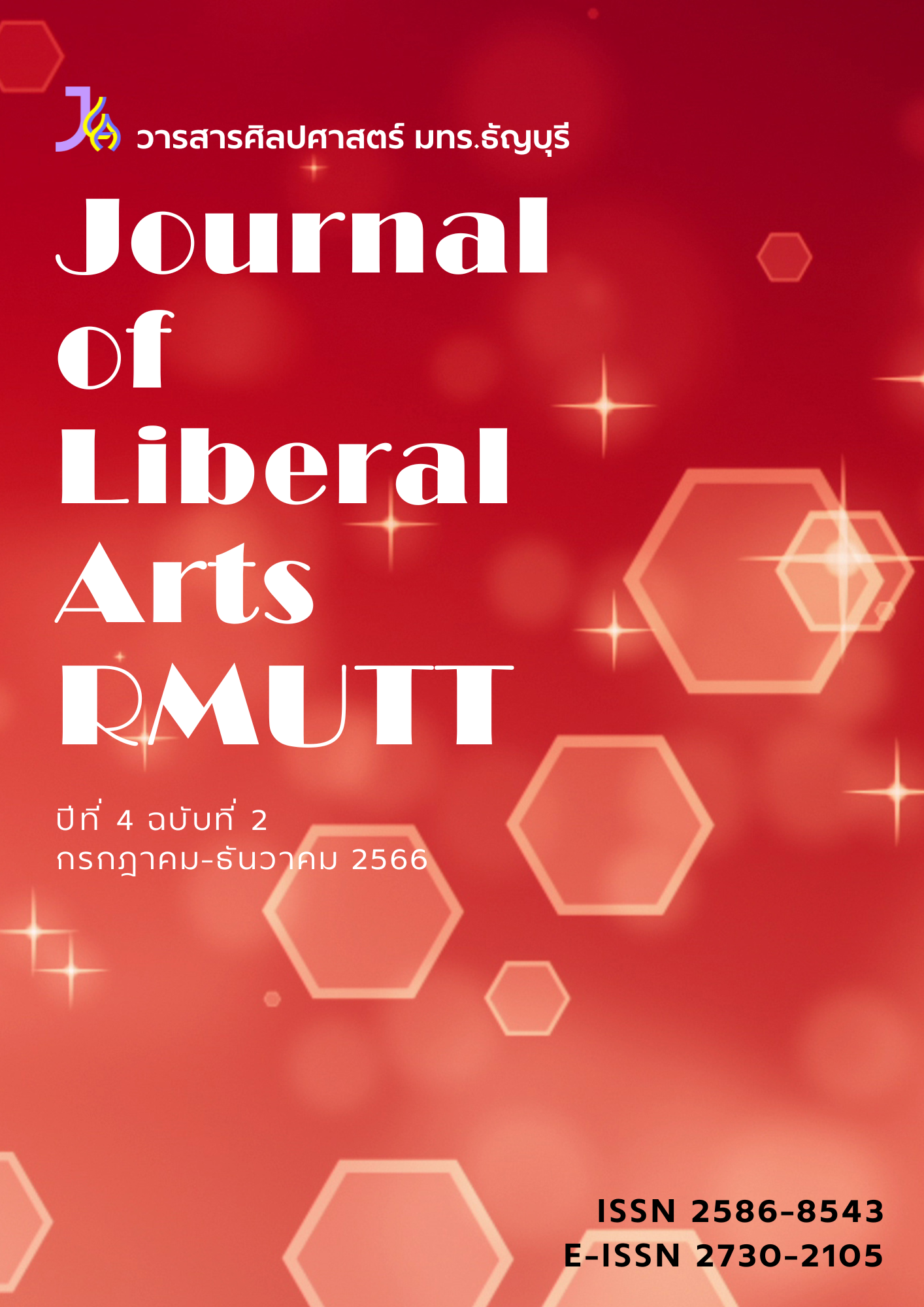English Vocabulary Board Game for Upper Primary School Students in Small and Medium-Sized Schools
DOI:
https://doi.org/10.60101/jla.2023.4.2.2814Keywords:
board game, English vocabulary, game-based learning, English language teachingAbstract
The objectives of this research were 1) to study the results of using board game to improve English vocabulary for upper primary school students in small and medium-sized schools, and 2) to study the students’ satisfaction after using board game. There were a total of 100 students: 50 students from small-sized schools, and 50 students from a medium-sized school. The samples were selected by using multi-stage sampling method. The research instruments were the English vocabulary board game, pre- and post-tests, a behavior observation form, an interview form, and a satisfaction evaluation form. Frequency, mean, percentage, standard deviation, and t-tests, were used to analyze the data.
The research findings indicated that both small and medium-sized school students' scores were increased after using the board game at the statistically significant level of .001. Additionally, students’ satisfaction was at a high level supported by the observation data and interview results.
References
Alemi, M. (2010). Educational games as a vehicle to teaching vocabulary. The Modern Journal of Applied Linguistics, 2(6), 425-438.
Barbara, J. (2017). Measuring user experience in multiplayer board games. Games and Culture, 12(7–8), 623–649. https://doi.org/10.1177/1555412015593419
Billinghurst, M., & Kato, H. (2002). How the virtual inspires the real. Communications of the ACM, 45(7), 64-70.
Carter, M., Gibbs, M., & Harrop, M. (2014). Drafting an army: The playful pastime of warhammer 40,000. Games and Culture, 9(2), 122–147. https://doi.org/10.1177/1555412013513349
Dastgoshadeh, A. & Jalilzadeh, K. (2011). Language loss, identity, and English as an international language. European Journal of Social Sciences. 21(4), 659-665.
Ferreira, L. (2007). How to Teach Vocabulary Effectively: An Analysis of the Bbook Course Eyes and Sspies. Praia.
Fotini, G., & Makrina, Z. (2017). Adapting Board Games to Stimulate Motivation in Vocabulary Learning in Six Year Old Learners a Case Study. Journal of Studies in Education, 7(3), 1-28.
Fung, Y. M. & Min, Y. L. (2016). Effects of Board Game on Speaking Ability of Low-Proficiency ESL Learners. International Journal of Applied Linguistics and English Literature, 5(3), 261-271. https://doi.org/10.7575/aiac.ijalel.v.5n.3p.261
Gass, S., & Selinker, L. (2001). Second language acquisition. Manhwah: Lawrence Elbaum associate.
Hair, J. F., Hult, G. T. M., Ringle, C. M., & Sarstedt, M. (2022). A Primer on Partial Least Squares Structural Equation Modeling (PLS-SEM) (3rd ed.). Thousand Oaks, CA: Sage.
Hartshorne, J. K., Tenenbaum, J. B., & Pinker, S. (2018). A Critical Period for Second Language Acquisition: Evidence from 2/3 million English Speakers. Cognition, 177, 263-277.
Jacobs, G. M. & Kline-Liu, K. (1996). Integrating Language Functions and Collaborative Skills in the Second Language Classroom. TESL Reporter, 29(1), 21-33.
Kanoksilapatham, B. (2018). Local Context-Based English Lessons: Forging Northern Thai knowledge, Fostering English Vocabulary. 3L the Southeast Asian Journal of English Language Studies, 24(2), 127–142. https://doi.org/10.17576/3l-2018-2402-10
Ketmuni, M., & Naenon, P. (2021). The Use of Board Games to Develop English Vocabulary of Ornamental and Flowering Plants Sold in the Community of Primary 5 (grade 5) Students at Nikornradburana School, Thailand. Psychology and Education, 58(1), 1484-1489.
Langran, J. & Purcell, S. (1994). Language games and activities. Retrieved on May 7, 2023, from https://files.eric.ed.gov/fulltext/ED382019.pdf
Lee, J.M. (1996). English Games. Seoul: The People Publisher.
Lenneberg, E. H. (1967). The Biological Foundations of Language. Hospital Practice, 2(12), 59-67.
Li, Y., Han, Y., & Gao, X. (2018). Young Learners’ Motivation for Learning English. In Sue Garton & Fiona Copland (eds.), The Routledge handbook of teaching English to young learners. (pp.60-72). London: Routledge.
Liao, H., & Chen, M., (2012). Effects of Vocabulary Games on Lexical Growth and Retention of Low-Motivated EFL Learners In Taiwan. The Asia-Pacific Education Researcher, 21(3), 564-575.
Mubaslat, M. (2011). The Effect of Using Educational Games on the Students’ Achievement In English Language for the Primary Stage. Retrieved on May 7, 2023, from https://files.eric.ed.gov/ fulltext/ED529467.pdf
Paradis, M. (2004). A Neurolinguistic Theory of Bilingualism. The Netherlands: John Benjamins Publishing.
Putri, C. R., Usman, B., & Nasir, C. (2016). Board Game in Speaking Skill. Research in English and Education (READ), 1(2), 146-151. from https://jim.usk.ac.id/READ/article/view/2583/1375
Richard-Amato, P. A. (1988). Making it Happen: Interaction in the Second Language Classroom: From Theory to Practice. New York: Longman.
Rubin, J., & Thompson, I. (1994). How to be a More Successful Language Learner. Boston: Heinle and Heinle Publishers.
Schmitt, N. (2010). Researching Vocabulary: A Vocabulary Research Manual. Springer. https://doi.org/10.1057/9780230293977
Sintapanon, S. (2010). Teaching Innovation to Improve the Quality of Young People (4th ed.). Bangkok: Technique Printing.
Srisatitnarangul, B. (2002). Nursing Research Methodology. Bangkok: Faculty of Nursing, Chulalongkorn University.
Stanovich, K. (2000). Progress in Understanding Reading: Scientific Foundations and New Frontiers. New York: Guilford Press.
The National Institute of Educational Testing Service (Public Organization). (2019). SummaryONETP6_2562. Retrieved on June 7, 2023, from http://www.newonetresult.niets.or.th/AnnouncementWeb/ PDF/SummaryONETP6_2562.pdf?fbclid=IwAR1JOWjhFnFhXBTNaBHFXiCKDuJy63A4C2_O6bVHEKsSVXvwQhVqeuJkyhg
Tunchalearnpanih, P. (2012). Using Games on P. 6 Student's Vocabulary Learning. BangkoK: Srinakharinwirot University (SWU), Thailand.
Vygotsky, L. (1978). Mind in Society. Cambridge, MA: Harvard University Press.
Zagal, J. P., Rick, J., & Hsi, I. (2006). Collaborative Games: Lessons Learned from Board Games. Simulation & Gaming, 37(1), 24–40. https://doi.org/10.1177/1046878105282279
Downloads
Published
How to Cite
Issue
Section
License
Copyright (c) 2023 Journal of Liberal Arts RMUTT

This work is licensed under a Creative Commons Attribution-NonCommercial-NoDerivatives 4.0 International License.













